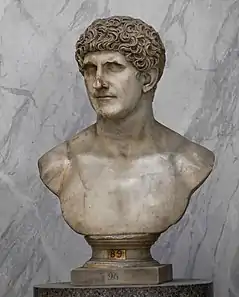Anthony
Anthony, also spelled Antony, is a masculine given name derived from the Antonii, a gens (Roman family name) to which Mark Antony (Marcus Antonius) belonged. According to Plutarch, the Antonii gens were Heracleidae, being descendants of Anton, a son of Heracles.[2] Anthony is an English name that is in use in many countries.[3] It has been among the top 100 most popular male baby names in the United States since the late 19th century and has been among the top 100 male baby names between 1998 and 2018 in many countries including Canada, Australia, England, Ireland and Scotland.[4]
 | |
| Pronunciation | UK: /ˈæntəni/, US: /ˈænθəni/[1] |
|---|---|
| Gender | Male |
| Language(s) | English |
| Origin | |
| Language(s) | Latin, possibly from Etruscan |
| Word/name | Antonius |
| Other names | |
| Alternative spelling | |
| Variant form(s) |
|
| Pet form(s) | Ant, Anton, Antonino, Nino, Toni, Tony, Tone, Toño |
Equivalents include Antonio in Italian, Spanish, Portuguese and Maltese; Αντώνιος in Greek; António or Antônio in Portuguese; Antoni in Catalan, Polish, and Slovene; Anton in Dutch, Galician, German, Icelandic, Romanian, Russian, and Scandinavian languages; Antoine in French; Antal in Hungarian; and Antun or Ante in Croatian. The usual abbreviated form is Tony or Toni (sometimes Tone, Ant, Anth or Anton). Its use as a Christian name was due to the veneration of Saint Anthony the Great, the founder of Christian monasticism, particularly in Egypt. Also significant was the later cult of Saint Anthony of Padua.
In the United States, it was the 43rd most popular male name in 2021, according to the Social Security Administration.[5] When the background is Italian, Nino or Toni, shortened from Antonino, are used. Its popularity in the United Kingdom peaked during the 1940s; in 1944 it was the sixth most popular male name and was still as high as 14th in 1964.[6]
Spelling and pronunciation
The name was historically spelled Antony, as in William Shakespeare's play Antony and Cleopatra. In the 17th century, the letter "h" was inserted into the spelling on the belief that the name derived from the Greek word ἄνθος (anthos), meaning "flower".[7][8] In Britain, the historical pronunciation /ˈæntəni/ predominates for both spellings, while in the United States the spelling pronunciation /ˈænθəni/ is more common when the "Anthony" spelling is used.[9]
Translations and variants
- Albanian: Andon (standard Albanian and Tosk Albanian dialect), Ndue (Gheg Albanian dialect), Anton
- Arabic: أنتوني، انطوان، انطون، طانيوس، طنّوس، مطانيوس
- Basque: Andoni, Antton
- Belarusian: Антось (Antos), Энтані (Entani)
- Bengali: এন্থনি (Ēnthoni), আন্তোনিও (Āntōni'ō)
- Bulgarian: Anton, Antonio, Antoan, Andon, Doncho, Toni
- Catalan: Antoni, Toni
- Chinese: 安东尼 (simplified), 安東尼 (traditional) (Mandarin: Āndōngní, Cantonese: Ōndūngnèih)
- Croatian: Anton, Antonio, Antonijo, Antun, Ante, Anto, Tonči, Tonći, Toni
- Czech: Anton, Antonín, Tonik, Tonda
- Dalmatian: Tuone
- Danish: Anton, Anthon
- Dutch: Anton, Antoon, Antonie, Antonius, Teun, Teunis, Theun, Theunis, Ton, Toon
- Esperanto: Antono, Anĉjo
- Estonian: Anton, Tõnis, Tõnu, Tõnn
- Filipino: Antonio, Antón, Onyo, Onying, Ton, Tonton, Tonio, Tonyo, Tunyíng
- Finnish: Anton, Anttoni, Antton, Antto, Toni
- French: Antoine, Antonin
- Galician: Antón
- German: Anton, Toni, Antonius, Tünn
- Greek: Αντώνιος (Antó̱nios), Αντώνης (Antonis), Andonios, Andonis
- Gujarati: એન્થની (Ēnthanī)
- Hawaiian: Anakoni, Akoni
- Hebrew: אנטוני, טוני
- Hindi: एंथनी (Ēnthanī)
- Hungarian: Antal, Tóni
- Irish: Antaine, Antoine, Antóin
- Italian: Antonio, Antonino, Antonello, Nino, Toni, Tonino, Tonio, Totò
- Japanese: アンソニー (Ansonī), アントン (Anton)
- Kannada: ಆಂಟನಿ (Āṇṭani)
- Korean: 앤토니 (Anthony)
- Latin: Antonius, Antoninus
- Latvian: Antonijs, Antons
- Lithuanian: Antanas
- Luxembourgish: Tun
- Macedonian: Anton, Antonij, Andon, Doncho
- Marathi: अंन्थोनी (Annthōnī)
- Malayalam: ആൻ്റണി (Antoni), അന്തോണി (Anthōṇī)
- Malta: Toni, Toninu, Ninu (Anthony)
- Mongolian: Антони (Antoni)
- Nepali: एन्थोनी (Ēnthōnī)
- Norwegian: Anton
- Persian: آنتونی
- Polish: Anton, Antoni, Antek, Antoś, Antonin, Tolek, Tonek
- Portuguese: António (fem. Antónia), Antônio (fem. Antônia), and Antão, with diminutives Tó, Toino, Toni and Toninho.
- Romanian: Anton
- Russian: Антон (Anton)
- Sami: Ante
- Serbian: Антоније (Antonije), Анто (Anto)
- Sheng: Anto, Toni
- Slovak: Anton, Tóno, Tónko (diminutive)
- Slovene: Anton, Tone
- Spanish: Antonio, Antón, Toni, Toño (diminutive)
- Swahili: Antoni, Antonio, Toni
- Swedish: Anton, Ante
- Sylheti: আন্তনি (Antoni)
- Tamil: அந்தோணி (Antōṇi)
- Telugu: ఆంథోనీ (Ānthōnī)
- Thai: แอนโทนี่ (Xæ n tho nī̀)
- Turkish: Antuvan
- Ukrainian: Антон (Anton), Антін (Antin), Антоній (Antonij)
- Urdu: انتھونی
See also
- All pages with titles beginning with Anthony
- All pages with titles containing Anthony
- Anthony (disambiguation)
- Anthony (surname)
- Andoni (given name)
- Anthon (given name)
- Anthoney
- Anthoni, name
- Anton (given name)
- Antoni
- Antonis
- Antonio
- Antonius
- Antony
- Antonia (name)
- Antoine
- Anfernee
- Thony (name)
- Tony (given name)
References
- Wells, John C. (2008). Longman Pronunciation Dictionary (3rd ed.). Longman. ISBN 978-1-4058-8118-0.
- Plutarch. "Antony".
He had also a noble dignity of form; and a shapely beard, a broad forehead, and an aquiline nose were thought to show the virile qualities peculiar to the portraits and statues of Heracles. Moreover, there was an ancient tradition that the Antonii were Heracleidae, being descendants of Anton, a son of Heracles.
- "Anthony". Name-doctor.com. Retrieved September 10, 2019.
- "Anthony". Thinkbabynames.com. Retrieved March 12, 2022.
- "Popular Baby Names". Ssa.gov. Retrieved 2021-11-27.
- "Anthony - Meaning And Origin Of The Name Anthony". BabyNames.co.uk. Archived from the original on 2015-03-02. Retrieved 2015-06-20.
- Withycombe, E. G. (1950) The Oxford Dictionary of English Christian Names; 2nd ed. Oxford: Clarendon Press; pp. 26-27
- Campbell, Mike. "Meaning, Origin and History of the Name Anthony". Behindthename.com. Retrieved 2015-06-20.
- Wells, John C. (1990). Longman Pronunciation Dictionary. Harlow, England: Longman. p. 30. ISBN 0-582-05383-8. entry "Anthony"
External links
- BehindTheName.com entry (also contains a list of versions of Anthony in other languages)